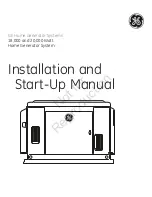
User Interfaces
SFC6400A/SFC1450A Synthesized Frequency Upconverter
4-22
TM106 – Rev. 1.1
4.3.4 Changing Control Mode Back to 'FT PANEL'
1.
Upon powering up, the Boot-Up Screen is shown in the LCD display.
2.
Press and release the Right Arrow Key until the SYSTEM Menu is displayed.
3.
Press and release the Down Arrow Key. The CONTROL MODE Screen is displayed.
4.
Press and release <ENTER> once. The cursor appears at the lower left corner of the LCD
Display.
5.
Press and release the Up Arrow Key until the bottom field displays "FT PANEL".
6.
Press and release <ENTER> once. The cursor is no longer visible, and the selection has
now been changed to "FT PANEL".
4.4 Remote Port User Interfaces
The SFC Upconverter Operator Serial Port allows a remote operator to control the converter.
Through the serial protocols (ASCII and RLLP) described below, the remote operator can control
gain, frequency, calibration, status, and fault isolation. The connector on the rear panel labeled J8,
OPERATOR SERIAL I/O (DB9 Female) is the physical port used for these protocols. It can be
configured as either a RS-232 or RS-485 interface. If RS-232 is selected, an adaptor is needed
between the converter connector J8 and the remote controller. See Section 5.9 for detailed pinout
information. The port is factory-set to communicate as the DCE (Data Communications Equipment)
with the following settings:
9600 baud
8 data bits
1 start bit
1 stop bit
no parity
The serial protocol is designed to provide DTE-to-DCE Point-to-Point Communications. The
converter is wired as the DCE to provide an interface to a dumb terminal (DTE) without a null
modem connection. Because the serial protocol uses unique addressable commands, the
converters are capable of providing multipoint communications between a number of converters and
a customer-supplied serial interface. The typical multipoint communications configurations include
full-and half-duplex RS-485. In addition, a multipoint RS-232 interface is also possible.
The theory of operation for multipoint requires that the M&C Computer Transmit Port be connected
in parallel to all of the Receive Data Ports of the various converters. Likewise, the transmit ports of
the various converters must all be connected in parallel and tied to the Receive Data Port of the
M&C Computer. To prevent any one Converter Transmit Port from acting as a low impedance, thus
hanging the bus, each transmit port of each converter remains in a high impedance state until
asked by the M&C computer to transmit.
Summary of Contents for SFC6400A
Page 2: ......
Page 14: ...Introduction SFC6400A SFC1450A Synthesized Frequency Upconverter 1 2 TM106 Rev 1 1 ...
Page 41: ...User Interfaces SFC6400A SFC1450A Synthesized Frequency Upconverter 4 18 TM106 Rev 1 1 ...
Page 61: ...User Interfaces SFC6400A SFC1450A Synthesized Frequency Upconverter 4 38 TM106 Rev 1 1 ...
Page 64: ...SFC6400A SFC1450A Synthesized Frequency Upconverter User Interfaces TM106 Rev 1 1 4 41 ...
Page 67: ...User Interfaces SFC6400A SFC1450A Synthesized Frequency Upconverter 4 44 TM106 Rev 1 1 ...
Page 82: ...Rear Panel Interfaces SFC6400A SFC1450A Synthesized Frequency Upconverter 5 10 TM106 Rev 1 1 ...
Page 96: ...Appendix A SFC6400A SFC1450A Synthesized Frequency Upconverter A 6 TM106 Rev 1 1 ...
Page 106: ...Appendix A SFC6400A SFC1450A Synthesized Frequency Upconverter A 16 TM106 Rev 1 1 ...
Page 117: ...SFC6400A SFC1450A Synthesized Frequency Upconverter Appendix A TM106 Rev 1 1 A 27 ...
Page 148: ...SFC6400A SFC1450A Synthesized Frequency Upconverter Appendix C TM106 Rev 1 1 C 19 END ...
Page 149: ...Appendix C SFC6400A SFC1450A Synthesized Frequency Upconverter C 20 TM106 Rev 1 1 ...
Page 156: ...SFC6400A SFC1450A Synthesized Frequency Upconverter Glossary TM106 Rev 1 1 G 7 ...
















































